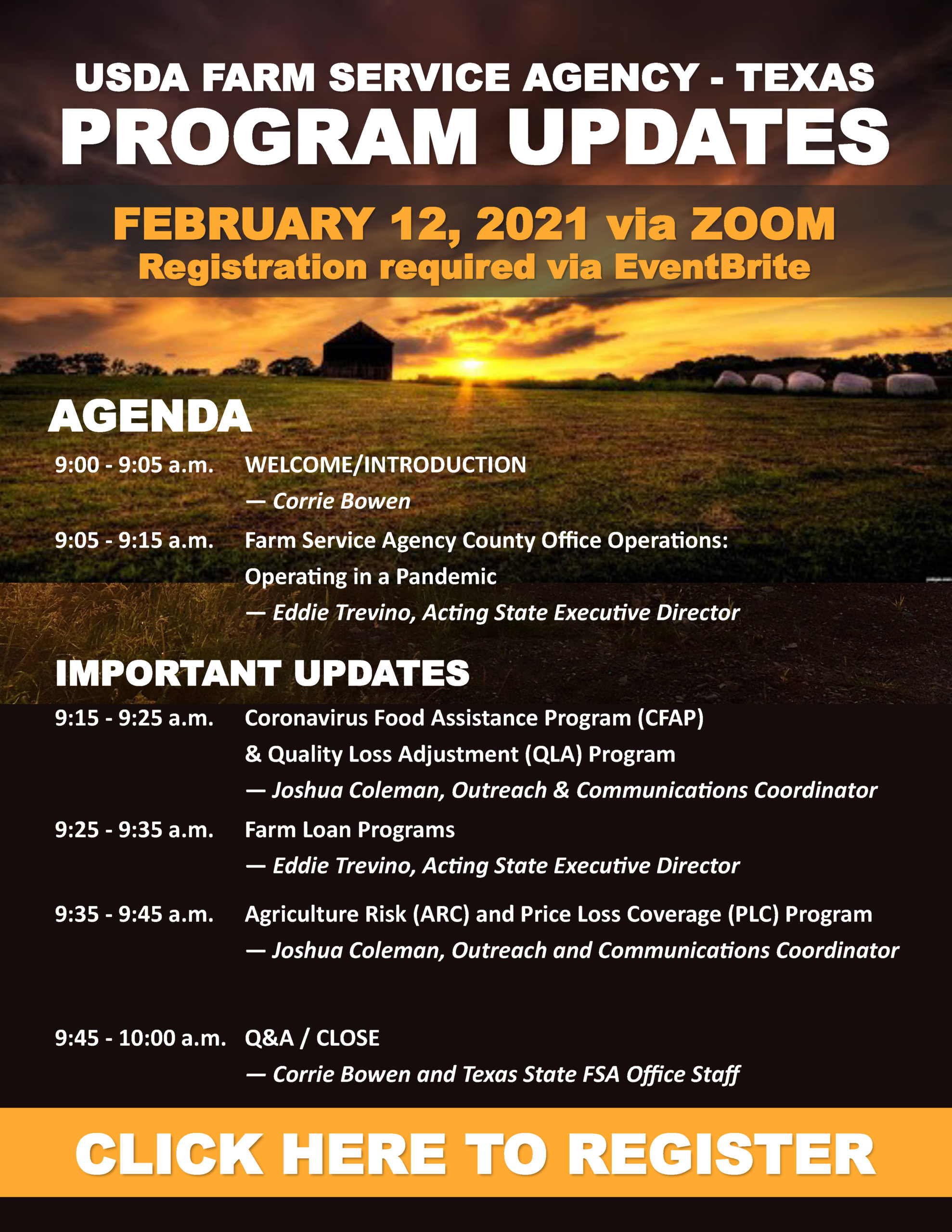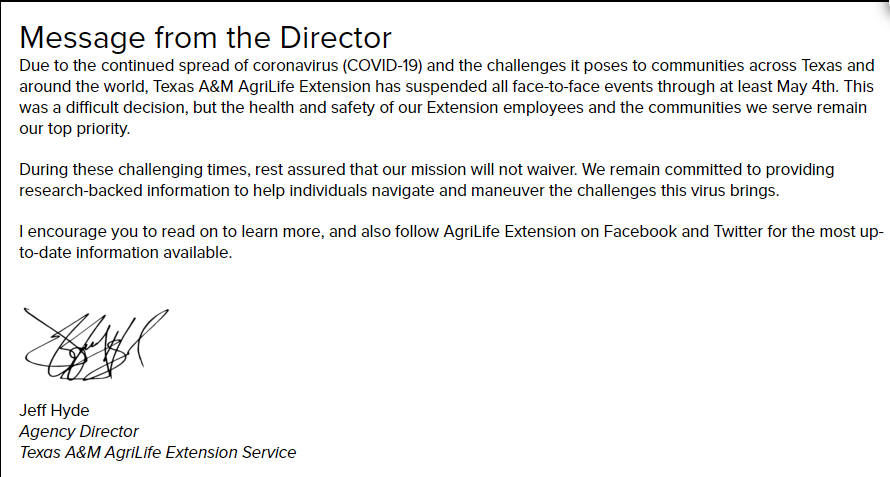USDA TEXAS FARM SERVICE AGENCY PROGRAM UPDATES
February 12, 2021 • 9:00a – 10:00a
Dear Extension Clientele,
We want to bring to your attention this upcoming one hour webinar event from the USDA Texas State Farm Service Agency on February 12, 2021. The online program will address navigating COVID-19 in the current stage of the pandemic. Important updates will include “Coronavirus Food Assistance Program (CFAP) and Quality Loss Adjustment Program (QLA)”, “Farm Loan Programs”, and “Agriculture Risk and Price Loss Coverage Program”.
Registration begins today and will last through February 11, 2021. To register for this free event, go to https://www.eventbrite.com/e/usda-farm-service-agency-texas-program-updates-webinar-tickets-139548151277?aff=.
2021-USDA-FSA-Program-Updates-Flyer-021221
D-
UPDATED COVID-19 GUIDELINES FROM TEXAS A&M AGRILIFE EXTENSION
December 4, 2020
Wharton County has been designated as a Red County. With that comes the following stipulations that will go into effect on December 9 – December 23:
Red Level: Counties with two of three factors pertaining to positivity rate of greater than 8% or more, OR a rapid rise in cases OR a hot spot
- No face to face Extension-hosted or Extension-sponsored events.
- No guest speaking or presenting at other entities’ events.
- No overnight events.
AgriLife Extension assists Texans in production agriculture
Texas A&M AgriLife provides CARES Act training and outreach for agricultural producers affected by COVID-19 pandemic
MAY 20, 2020
The Texas A&M AgriLife Extension Service, in collaboration with the office of Texas Gov. Greg Abbott, will be providing educational outreach and training to help producers of agricultural commodities throughout the state understand and acquire federal assistance to help them recover financially from the COVID-19 pandemic.
Patrick J. Stover, Ph.D., vice chancellor of Texas A&M AgriLife, dean of the College of Agriculture and Life Sciences and director of Texas A&M AgriLife Research, College Station, said helping agricultural producers better understand the CARES stimulus package is necessary to help secure the future food supply.
“The COVID-19 pandemic has had a negative impact on the food production and supply and has had a profound and far-reaching effect on those front-line farmers we depend on to meet our needs for food and nutrition,” Stover said.
AgriLife Extension director Jeff Hyde, Ph.D., College Station, said his agency’s initial phase of the collaboration with the governor’s office used AgriLife Extension’s unique, statewide reach to educate local officials serving counties, municipalities, communities and schools about the federal relief package.
“Now in this second phase, we are providing outreach and training statewide for those agricultural producers we rely upon to provide us with the food and fiber we need every day,” he said. “We hope our efforts will help them obtain the federal funding for which they are eligible as quickly as possible.”
Training on CARES Act
The free training course, “The CARES Act: Implications for Farmers and Ranchers,” can be found on AgriLife Extension’s online learning website, at agrilifelearn.tamu.edu
The training builds on a recent report by the Agricultural and Food Policy Center, or AFPC, at Texas A&M University that summarizes the financial relief resources made available to agricultural producers at https://www.afpc.tamu.edu/research/publications/files/699/RR-20-02.pdf
The Coronavirus Aid, Relief, and Economic Security, or CARES Act, will be instrumental in helping Texans recover from the economic devastation caused by the pandemic. For agricultural producers, much of the assistance will be provided through the U.S. Department of Agriculture, which has just finalized the process of finalizing details of the Coronavirus Food Assistance Program, CFAP.
“The CARES Act provides a number of tools to help workers, families and small businesses, including farmers and ranchers,” explained Bart Fischer, co-director of the Agriculture and Food Policy Center and AgriLife Research economist. “Now that USDA has finalized the details of CFAP, we stand ready to help make sure Texas producers have the information they need to apply as quickly as possible.”
Continued outreach
AFPC recently estimated that production agriculture losses in Texas as a result of the COVID-19 pandemic could be from $6-8 billion or more. The agricultural commodities identified as being most affected by the pandemic include weaned calves, stocker calves, feeder steers, sheep and goats, fruits and vegetables, and dairy products.
AgriLife Extension will continue to offer outreach and online trainings related to the CARES Act to help agricultural producers navigate the federal funding process so they may recover financially as quickly and effectively as possible. And AgriLife Extension agents and others will be available to assist producers with any questions related to the training and application process for federal funding.
Hyde noted AgriLife Extension will collaborate with the Texas agriculture industry, commodity associations and other groups to help ensure agricultural producers are aware of the agency’s trainings and of any other informational assistance available to them.
Texas A&M AgriLife, in collaboration with the office of Texas Gov. Greg Abbott, will provide training and educational outreach on the CARES Act as a way to help agricultural producers throughout the state. (Texas A&M AgriLife Extension Service photo)
Review of the Coronavirus Food Assistance Program
-30-
Paul Schattenberg
210-859-5752
paschattenberg@ag.tamu.edu
Corrie P. Bowen
County Extension Agent – Agriculture & Natural Resources
Wharton County
979-532-3310
cbowen@ag.tamu.edu
COVID-19 RELIEF FOR FARMERS, RANCHERS
Texas A&M publication identifies federal COVID-19 relief most applicable to agricultural producers
APRIL 21, 2020
The Agricultural and Food Policy Center at Texas A&M University has identified COVID-19 relief most applicable to farmers and ranchers. (Texas A&M AgriLife photo by Kay Ledbetter)
The Agricultural and Food Policy Center at Texas A&M University in College Station has developed a briefing paper that identifies provisions most applicable to agricultural producers in the three recent Congressional interventions to stimulate the economy and provide COVID-19 relief.
“Texas A&M AgriLife is providing information and marshaling its resources to help agricultural producers through this difficult time to ensure consumers have access to healthy food and other essential agricultural products, ” said Patrick J. Stover, Ph.D., vice chancellor for Texas A&M AgriLife, dean of the College of Agriculture and Life Sciences and director of Texas A&M AgriLife Research. “This publication will direct farmers and ranchers to helpful resources for financial relief in order to remain operational until the situation improves.”
To date, Congress has intervened on three separate occasions to provide relief funding related to the COVID-19 pandemic, said Bart Fischer, Ph.D., center co-director and one of the report’s authors.
“The latest package — the Coronavirus Aid, Relief and Economic Security Act, also known as the CARES Act — provides $23.5 billion for the Secretary of Agriculture to assist agricultural producers,” he explained. “There was $9.5 billion for COVID response and $14 billion replenishment for the Commodity Credit Corporation, which serves as the traditional funding arm of the U.S. Department of Agriculture (USDA).”
Fischer said USDA is working out the details of how to use this funding and expects a plan will be forthcoming soon.
”The CARES Act provided the $9.5 billion to prevent, prepare for and respond to coronavirus by supporting U.S. agricultural producers impacted by the pandemic,” said Joe Outlaw, Ph.D., Texas A&M AgriLife Extension Service agricultural economist and center co-director who co-authored the report. “This funding would apply to producers who supply local food systems, such as farmers markets, restaurant and schools, as well as livestock and dairy producers and those who produce specialty crops.”
The funding was provided independently of the Commodity Credit Corporation, and while the CARES Act provided it with additional funding, it did not increase its borrowing authority.
“While the CARES Act funding applies broadly to agricultural producers, most expect the funding to be used primarily for beef, pork, dairy and specialty crop producers,” Outlaw noted.
The act also provided additional flexibility for marketing loans, extending the maturity date by three months for loan commodities, Fischer said.
Perhaps most notably, the act provided $349 billion for the Paycheck Protection Program, or PPP, a new lending program of the Small Business Administration program for which farmers and ranchers are eligible.
“Despite some initial confusion, farmers and ranchers are eligible to apply,” Fischer explained. “The loan, both principal and interest, is forgivable as long as certain conditions are met.”
He noted, however, initial PPP funding was quickly exhausted and Congress is now in the process of approving additional funding for the program. Fischer and Outlaw said the Agricultural and Food Policy Center is currently working on an assessment of damages to Texas agriculture due to the COVID-19 pandemic. In addition, once the USDA announces details of producer support from the CARES Act, the center will draft a follow-up report covering those details. Fischer also noted Wildfires and Hurricanes Indemnity Program Plus, or WHIP+, signup is underway, and USDA is reminding farmers they may be entitled to some relief through that program as well.
Starting March 23, producers who suffered losses from drought or excessive moisture in either or both 2018 or 2019 can apply for WHIP+ assistance at their local Farm Service Agency office. Some area of the county in which their loss occurred must have been rated D3 or higher on the U.S. Drought Monitor during one or both of those calendar years.
More detail on the WHIP+ program can be found in the AgriLife Today story “Disaster relief authorized for crop producers affected by extreme drought.”
“While WHIP+ is for loses from past crops, it comes at a particularly helpful time as producers are trying to cash flow this year’s crop against a backdrop of terrible prices,” Fischer said.
The Agricultural and Food Policy Center has also produced COVID-19 Impact on Texas Production Agriculture — a publication on the economic impact the COVID-19 pandemic has had on various agricultural commodities throughout the state.
-30-
Paul Schattenberg
210-859-5752
paschattenberg@ag.tamu.edu
Corrie P. Bowen
County Extension Agent – Agriculture & Natural Resources
Wharton County
979-532-3310
cbowen@ag.tamu.edu
Ag Worker Essential Critical Infrastructure Authorization
AGRICULTURAL WORKER ESSENTIAL CRITICAL INFRASTRUCTURE AUTHORIZATION
On March 19, 2020 the Department of Homeland Security identified the specific industries that comprise Critical Infrastructure Industries (available at https://www.cisa.gov/publication/guidance-essential-critical-infrastructure-workforce).
Texas Agriculture Commissioner Sid Miller requested Texas Governor Greg Abbot recognize the agriculture industry as an essential industry which provides a service indispensable in the effort to protect our nation’s food supply. In a letter to Governor Abbott, Commissioner Miller stressed the significant role farmers and ranchers play during the COVID-19 health emergency.
If you are an Essential Critical Infrastructure Worker, you may find a link to the authorization letter at https://www.texasagriculture.gov/Portals/0/forms/COMM/Essential_Worker_Travel_Form_3.25.2020.pdf
This document certified by Sid Miller certifies that the bearer is an agricultural worker and/or food production worker involved in the production of field crops, the manufacture of human food and/or the distribution of agricultural products and other human food through wholesale, retail, and/or foodservice distribution within a sector that has been designated as critical infrastructure.
Notice that this is an official government document subject to the provisions of Texas Penal Code Sec 37.10 – Tampering with Governmental Record. Misuse of this document subjects a fraudulent user to criminal prosecution.
-30-
Corrie P. Bowen
County Extension Agent – Agriculture & Natural Resources
Wharton County
979-532-3310
cbowen@ag.tamu.edu
AgriLife Extension Provides Online Auxin Training
COVID-19 might have much of the world social distancing, but agricultural crops still must be planted, and producers still have regulations to follow. Texas A&M AgriLife Extension Service is ready to help the process.
Agricultural producers needing auxin training can still turn to AgriLife Extension for their continuing education credits, CEUs, despite the COVID-19 cancellation of all in-person meetings and trainings. This auxin training qualifies for one CEU of laws and regulations. To receive a certificate of completion for the course, participants must obtain a score of 100% on the online Auxin Specific Applicator Test. The learner may retake the test as often as is necessary.
To access the Online Auxin Training, please click on this direct link.
To view the AgriLife Extension notice about Auxin and CEU trainings, please click on the link below:
https://agrilifetoday.tamu.edu/2020/03/23/agrilife-extension-provides-auxin-ceu-training-online/
If you have any questions, please contact the Wharton County Extension Office at 979-532-3310 or cbowen@ag.tamu.edu


